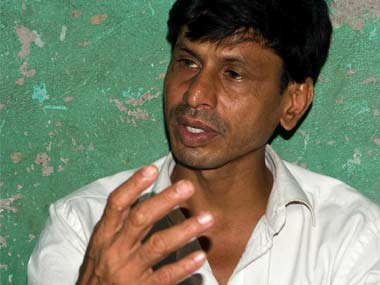“Staunch Hindus will migrate to India. Those who can convert to Islam will remain in Pakistan,” says Arjun Das, a 40-year-old Pakistani Hindu who has been living in India for over a year. Das arrived in India from Pakistan’s Sindh province with 146 others on a tourist visa. Legally, they were to return to Pakistan within 30 days. But Das, whose four brothers are still in Sindh, said he had always intended to stay. In the last week there has been continuous media coverage of people like Das who don’t want to return to Pakistan because of alleged atrocities committed on them by members of the majority Muslim population. There are around 4.5 million Hindus in Pakistan to its 180 million Muslims. Taken aback by the Hindu exodus from Pakistan, the Indian government has drawn flak from the opposition who want it to rehabilitate Pakistani Hindus in India. The pressure has resulted in a change of the government stand , where it has has moved from declaring the issue to be an internal matter in Pakistan, to now saying that it will grant these families long term visas if applied under the proper procedure. Meanwhile, an embarrassed Pakistan is involved in a face saving exercise. Interior minister Rehman Malik has made assurances that he will look into the matter. Pakistan President Asaf Ali Zardari has formed a three-member committee to examine the allegations of the Hindus who are mostly centred in and around Sindh, Hyderabad Karachi, Shikarpur, Mithi and Sukkur. [caption id=“attachment_421362” align=“alignleft” width=“380”]  Arjun Das migrated to India in July last year: Naresh Sharma/Firstpost[/caption] While de-boarding the Samjhauta Express in Attari, some Pakistani Hindus are vocal about what they experience in their native country. Mukesh Kumar Ahuja told Headlines Today that his cousin Ravi was killed as he could not pay Rs 1 crore demanded by gunmen. Ahuja is in India with his wife and four children in the hopes of receiving political asylum. Others say they are in India only for pilgrimage and have no plans to settle here- a category, who according to Das, does not exist. “If given a chance, they will never return to Pakistan. They are not telling the truth as they fear for their extended families and relatives in Pakistan,” he said. In his early days in Delhi, Das also experienced this fear. He and fellow migrants did not readily volunteer that they were planning to stay back in India. He said he was scared of the reaction of the Pakistan government and there was no assurance from Indian government that it would grant them asylum. As he gets the news of more such families wanting to shift their base to India however, he is more forthcoming. Das relates how the 1992 Babri Masjid demolition in India changed things for Pakistani Hindus. “Muslims in Pakistan demolished our temples. Since then, the kidnapping of our girls and forced conversions are common in Pakistan,” he said. “We cannot send our girls to schools and colleges because they will get abducted. To do business, we should have a Muslim partner.” But Das’ life in Delhi is not easy. Along with his fellow migrants, they initially tried settling in Majnu ka teela area near Delhi University’s North campus. But steep rents and the absence of a social security net made it difficult for them. Das and his sons, Mukesh and Jagdish, presently sell vegetables in neighbourhood colonies. They can not apply for any job which require them to produce any sort of government identity. But some help is forthcoming from Nahar Singh, a central government employee affiliated to VHP. He used to run a private school in Brijwasan- an urban village on the Delhi Gurgaon border, about a 15 minute drive from the IGI airport. But when he heard about the plight of these families, Singh said he converted the school into a makeshift accommodation for them. Singh propagates the ideology that India is for Hindus and Pakistan is for Muslims. “It is the right of these families to live in India. The government has no option but to legitimize this right,’ he said.
Arjun Das, a Pakistani Hindu who has been living in Delhi for over a year, describes the plight of his community and why they are migrating to India in such large numbers.
Advertisement
End of Article


)

)
)
)
)
)
)
)
)



